with a "swagga! CNN anchors Kyra Phillips and T.J. Holmes discuss.
Nice touch, CNN behind the scenes with the music in the background! ;)
Callie Shell has spent much of the past 100 days working behind the scenes to capture what life is like at the White House. Shell, who works on contract for Time magazine, has been one of a very few photographers with personal access to the Obama family since Barack Obama announced his candidacy. ...via NPR


Also read the interview with Barack Obama from this weekend's NYT magazine. As always, ample proof that he gets nuance and has a way of delivering just the right words!President Obama and first lady Michelle Obama share a moment in the Red Room of the White House along with adviser Valerie Jarrett and other staffers. "They had just a second together to say hi," says Shell, "and they have an amazing ability to tune the world out for just two seconds."
The silence siphoned out of the city and into our ears, spilling from there into our dreams and beliefs, our memories and expectations. In the wake of each fresh episode a new feeling flowed through us, full of warmth and a lazy equanimity. It took us a while to recognize the feeling for what it was: contentment.
The silence was plain and rich and deep. It seemed infinitely delicate, yet strangely irresistible, as though any one of us could have broken it with a single word if we had not been so enraptured.
Every day the silence that had engulfed the city receded further into the past. It was plain that in time we would forget it had ever happened. The year that had gone by would leave only a few scattered signs behidn, like the imprints of vanished shells in the curst of a dried lake bed: the exemplary hush of our elevators, the tangles of useless wire in our walls, and the advanced design of our subway lines, fading slowly into antiquation.
 As those following my music blog posts may know, I am a big fan of music from Mali. And it seems two Malian singers - Rokia Traore (see my blog post for some videos) and the blind husband-wife pair Amadou-Mariam (youtube video) have won major awards at the inaugural Songlines World Music Awards.
As those following my music blog posts may know, I am a big fan of music from Mali. And it seems two Malian singers - Rokia Traore (see my blog post for some videos) and the blind husband-wife pair Amadou-Mariam (youtube video) have won major awards at the inaugural Songlines World Music Awards.The Songlines Music Awards were established to continue the tradition of the now-defunct BBC Radio 3 Awards for World Music, recognizing outstanding talent in world music.
To listen to Kiran's songs, go to her website. It starts streaming few of her songs, in full. On Twitter, she mentions recent collaborations for fusion with Italian aria and Hip-Hop. Interesting! Will need to explore further.Best Artist - Rokia TraoréBest Group - Amadou and MariamCross-cultural Collaboration - Jah Wobble & The Chinese Dub OrchestraNewcomer - Kiran Ahluwalia
"Fact / Fiction / Promises / Progress ... they are all very nebulous concepts. If we are going to judge the president on an arbitrary timeframe, shouldn't we also have an arbitrary scale."
| How to Judge a Guy in 100 Days | ||||
| ||||
 Jon does the action of shooting himself and then quips: "Its the first lady. Really? You are going to grade the first lady. f you are the first lady and you don't sit on Mr T's lap (picture of Nancy Reagon on Mr T's lap in the background), you get an A. The bar is not that high" :)
Jon does the action of shooting himself and then quips: "Its the first lady. Really? You are going to grade the first lady. f you are the first lady and you don't sit on Mr T's lap (picture of Nancy Reagon on Mr T's lap in the background), you get an A. The bar is not that high" :)Grading Obama - Larry Wilmore never thought a black guy in charge would take all the fun out of being black.And then Jon Stewart "puts it to bed" with an interview with Pulitzer Prize Winning Author and Presidential Historian Doris Kearns Goodwin [1], who believes Obama is in FDR territory after his first 100 days.
"Why are we treating him like a Toyota that turned over its odometer"
Doris Kearns Goodwin
Daily Show
Full EpisodesEconomic Crisis First 100 Days
Africans have more genetic variation than anyone else on Earth, according to a new study that helps narrow the location where humans first evolved, probably near the South Africa-Namibia border. The largest study of African genetics ever undertaken also found that nearly three-fourths of African-Americans can trace their ancestry to West Africa. The new analysis published Thursday in the online edition of the journal Science. "Given the fact that modern humans arose in Africa, they have had time to accumulate dramatic changes" in their genes, explained lead researcher Sarah Tishkoff, a geneticist at the University of Pennsylvania. People have been adapting to very diverse environmental niches in Africa, she explained in a briefing. Over 10 years, Tishkoff and an international team of researchers trekked across Africa collecting samples to compare the genes of various peoples. Often working in primitive conditions, the researchers sometimes had to resort to using a car battery to power their equipment, Tishkoff explained.

It is the book of an artist contending first of all with himself, his sense of emotional dead ends, the limits of poetic community, the contradictions of his assimilation by that community, his embrace and rejection of it: searching what possible listening, what possible love or solidarity might exist out beyond those contradictions. It is the book of a young artist doing what some few manage or dare to do: question the foundations of the neighborhood in which he or she has come of age and received affirmation.To further expand on that, here are some words from Baraka himself from the preface to the Baraka Reader:
My writing reflects my own growth and expansion, and at the same time the society in which I have existed throughout this confrontation. Whether it is politics, music, literature, or the origins of language, there is always a historical and time/place/condition reference that will always try to explain why I was saying both how and for what.
And it is a book, not an assemblage of occasional poems: a soul-journey borne in conflictual music, faultless phrasing. Music, phrasing of human flesh longing for touch, mind fiercely working to decipher its predicament. Titles of poems are set sometimes in bold, sometimes italics, implying structures within the larger structure. Drawing both on black music and the technical innovations of American Modernism, Jones moves deeper into a new poetics, what the poet June Jordan would name “the intimate face of universal struggle.”And identity is never simple either. In contrast to Hughes' poems, which incorporated into poetry the aesthetics of the blues as the experience of a race, Amari writes in his poem, Notes For a Speech:
But intimacy is never simple, least of all in poems like these where “inept tenderness” (“A Poem for Neutrals”) searches for an ever-escaping mutuality.
African bluesLike Adrienne Rich writes about his poem, An Agony. As Now., which deals with existential anguish but in a "surround of social hatred":
does not know me. Their steps, in sands
of their own
land.
..
My own
dead souls, my, so called
people. Africa
is a foreign place. You are
as any other sad man here
american.
Here is self-wrestling of a politicized human being, an artist/intellectual, writing among the white majority avant-garde at a moment when African revolutions and black American militance seemed to be converging in the electric field of possible liberations. Experiencing the American color line—that deceptively, murderously, ever-shifting, ever-intransigent construct—as neither “theme” nor abstraction, but as disfiguring all life, and in a time when “revolution” was still a political, not a merchandising term, Jones’s poems both compress and stretch the boundaries of the case. “Also this poem, which is included in Rich's essay:
/ the societyLike Rich writes:
the image, of
common utopia.
/ The perversity
of separation, isolation,
after so many years of trying to enter
their kingdoms,
now they suffer in tears, these others,
saxophones whining
through the wooden doors of their less
than gracious homes.
The poor have become our creators. The
black. The thoroughly
ignorant.
Let the combination of morality
and inhumanity
begin.
There is much more to read and enjoy, not only in Baraka's poetry but also in Rich's essay. I leave you to go read it in its entirety.
The poem’s structure spirals like a staircase, where “the society / the image, of / common utopia” turns sharply into “The perversity / of separation, isolation,” this turn signified by a full-stop and capital letter. And, since the poet is located between worlds, there is a necessary ambiguity to the pronouns, the “they” and the “our.”
 Seems...
Seems...President Obama to spend 100th day in spotlight
The White House wants you to know that Wednesday is just like any other day.
But for those who insist on highlighting President Barack Obama's 100th day in office, the White House will play along.The president will mark Wednesday's milestone with two high-profile events, both designed to highlight the accomplishments of his fledgling administration.And so it goes.
He has already been the subject of obsessive news media coverage, and now he will be the subject of a children’s book. Bo the Portuguese water dog who recently became the first presidential pet in the Obama White House, is the star of “Bo, America’s Commander in Leash,” expected in stores by the end of the month. Mascot Books, a small independent publisher in Herndon, Va., specializing in titles based on university and school mascots, is rushing the book out to capitalize on the fervor surrounding the Obamas’ new dog. “Bo” is written by Naren Aryal, a founder of Mascot Books, and illustrated by Danny Moore, one of its employees. Mr. Aryal said he and Mr. Moore had been working on the project for about two months, leaving space for pictures of the dog, once it was chosen. Mr. Aryal said the Obamas’ two daughters aren’t named in the book because he wanted to protect their privacy.and more via Denver Post.
Suicide is, after all, the opposite of the poem. Sylvia and I often talked opposites. We talked death with burned-up intensity, both of us drawn to it like moths to an electric lightbulb, sucking on it.
Thief --Sadly, Anne Sexton herself was to commit suicide three years later.
how did you crawl into,
crawl down alone
into the death I wanted so badly and for so long,
the death we said we both outgrew,
the one we wore on our skinny breasts,
the one we talked of so often each time
we downed three extra dry martinis in Boston,
the death that talked of analysts and cures,
the death that talked like brides with plots,
the death we drank to,
the motives and the quiet deed?
On October 4, 1974, Sexton had lunch with Kumin to review Sexton's most recent book, The Awful Rowing Toward God. Upon returning home, she put on her mother's old fur coat, locked herself in her garage, started the engine of her car and committed suicide by carbon monoxide poisoning.
Love and hate are the same thing
Many people seem to think that if you talk about something recent, you're in favor of it. The exact opposite is true in my case. Anything I talk about is almost certain to be something I'm resolutely against, and it seems to me the best way of opposing it is to understand it, and then you know where to turn off the button."That's Marshall McLuhan. (via submitted for your perusal)
KR: When I first met Carol, I was so glad to find somebody I could really talk to. There were people who I could drop a stone down and hear it go plunk really fast. But I could drop a stone down Carol and never hear it hit the bottom.
I: How are you two coping with Carol's illnes?
KR: I was just down at the store this morning, and a man was talking on his cell phone and he was saying, It wasn't just a camping trip; it was a survival class. And I was thinking how funny that was, because I'm having a survival class at my house. You don't have to go out and get it. It will come to you. We're all having a suvival class; you just have to wait.
Interviewer: Do you feel that part of the laureate job is to convince the reading public that poetry is useful?
KR: It's poetry's uselessness that excites me. Its hopelessness. All this tal of usefulness makes me feel I've suddenly been shanghaied into the helping professions. Prose is practical language. Conversation is practical language. Let them handle the usefulness jobs. But of course, poetry has its balms. It makes us less lonely by one. It makes us have more room inside ourselves. But it's paralyzing to think of usefulness and poetry in the same breath.
I: Why do you think writing attracted you?KR: It's a way of thinking unlike any other. Brodsky considers poetry a great accelerator of the mind and I agree. Thinking takes place in language, and it's hard to say whether the language is creating the thinking or the thinkng is creating the language. If I don't write poetry, in the profoundest way I have no way to think.
I: How do you find the subject in a poemKR: I don't know if I'm interested in combating an idea or just loosening it up. You have to make some room for your mind. You have to open something up. And you can't just slam it from the other side. You can't say, That's not right. This is right. You start fluffing it. You open up the picture, so you can know two things at once.
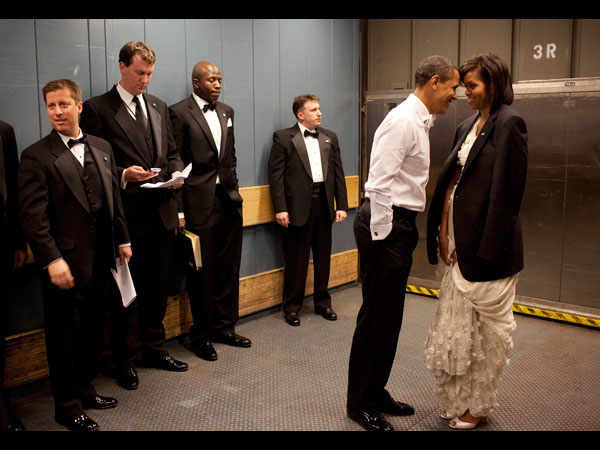
Photograph by Pete Souza/White House |

Here's some advice to Americans who still have a nice vacation budget:Like who? Hedge fund managers and others who made millions and do not care about the current economic woes? Anyways, lets continue to the topic at hand.
Take advantage of the "Obama Effect" and visit Europe, particularly Prague (the best bargain city). But those who detest tourist traps still might want to give Paris a good leaving-alone.If you really have some vacation money, go read up the articles for the survey details and suggestions for cities with bargains, tourist traps, helpful locals, and clean cities!
..
The Obama Effect? According to the survey, the recent election of Barack Obama has left Europe awash with rampant congeniality toward Americans. In fact, 44 percent of survey respondents suggested that Obama's election has helped gentle the condition of even the snootiest of Continental waiters and alchemized them into more amiable and thoughtful hosts.
The passage is from Stevens' essay "Two or three ideas" (from Opus Posthumous; NYT Review). Though written in prose, it is supposed to be "a great hymn to absence and to the heroically human self."To see the gods dispelled in mid-air and dissolve like clouds is one of the great human experiences. It is not as if they had gone over the horizon to disappear for a time; nor as if they had been overcome by other gods of greater power and profounder knowledge. It is simply that they came to nothing. Since we have always shared all things with them and have always had a part of their strength and, certainly, all of their knowledge, we shared likewise this experience of annihilation. It was their annihilation, not ours, and yet it left us feeling that in a measure, we, too, had been annihilated. It left us feeling dispossessed and alone in a solitude, like children without parents, in a home that seemed deserted, in which the amical rooms and halls had taken on a look of hardness and emptiness. What was most extraordinary is that they left no mementoes behind, no thrones, no mystic rings, no texts either of the soil or of the soul. It was as if they had never inhabited the earth. There was no crying out for their return. They were not forgotten because they had been a part of the glory of the earth. At the same time, no man ever muttered a petition in his heart for the restoration of those unreal shapes. There was always in every man the increasingly human self, which instead of remaining the observer, the non-participant, the delinquent, became constantly more and more all there was or so it seemed; and whether it was so or merely seemed so still left it for him to resolve life and the world in his own terms.
.. liked to speak of his poems as narratives, as in his reply to a questionnaire in 1934: "Poetry is the rhythmic, inevitably narrative, moment from an overclothed blindness to a naked vision that depends in its intensity on the strength of the labor put into the creation of the poetry. My poetry is, or should be, useful to me for one reason: it is the record of my individual struggle from darkness towards some measure of light."
"I make one image, though "make" is not the right word; I let, perhaps, an image be made emotionally in me and then apply to it what intellectual and critical forces I possess -- let it breed another; let that image contradict the first, make, of the third image bred out of the other two, a fourth contradictory image, and let them all, within my imposed formal limits, conflict. Each image holds within it the seed of its own destruction, and my dialectical method, as I understand it, is a constant building up and breaking down of the images that come out of the central seed, which is itself destructive and constructive at the same time . . . The life in any poem of mine cannot move concentrically round a central image, the life must come out of the center; an image must be born and die in another; and any sequence of my images must be a sequence of creations, recreations, destructions, contradictions . . . Out of the inevitable conflict of images . . . I try to make that momentary peace which is a poem."
“Congressional elections are not all about the economy.Rather, they’re all about the president. The correlation between the president’s Gallup approval rating immediately prior to the midterms and his party’s performance has been very strong. In fact, once the president’s approval rating is accounted for, knowing about the economy doesn’t tell anything more about how to predict the outcome of the midterms.

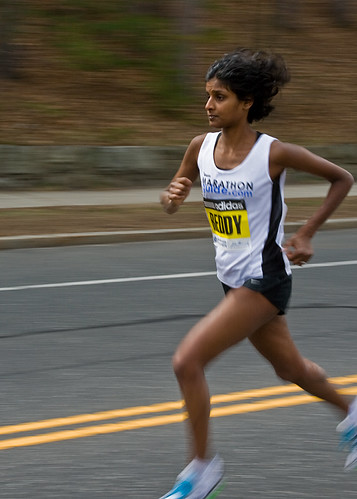
Reddy was a member of the track and tennis teams at the Moses Brown School in Providence, RI, but took time off from running while studying at Wesleyan University in Connecticut. She later joined the cross country and track teams at Wesleyan, and entered her first marathon while in college, which turned out to be a painful 3:40 experience. She has since dramatically improved her time, placing sixth at the 2004 Ottawa Marathon (2:49:14), and finishing as the sixth American at the 2004 New York City Marathon (2:49:55) while starting behind the elite field. She set her marathon personal best at Grandma’s Marathon in Minnesota in 2006, finishing fifth in 2:41:30. She rounded out her marathon season with a strong 20th-place finish at The LaSalle Bank Chicago Marathon in 2:42:03. Reddy, who ran the Boston Marathons in 2002 and 2003, has already qualified for the 2008 Olympic Team Trials in Boston with her performances at Grandma’s.
Personal Notes:
Reddy was born in Rhode Island and attended the Moses Brown School in Providence where she ran track. She attended Wesleyan University where she received her bachelor’s of arts degree. She later earned her master’s in architecture from the University of Pennsylvania and works as an architect at Ballinger Architects in Philadelphia.
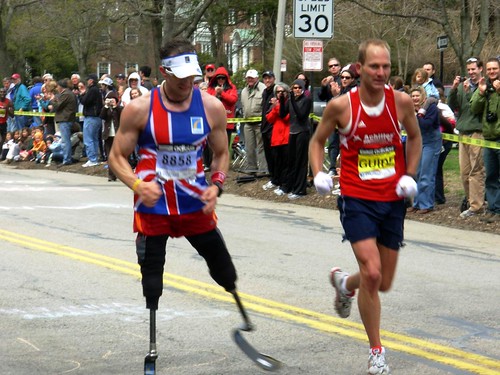
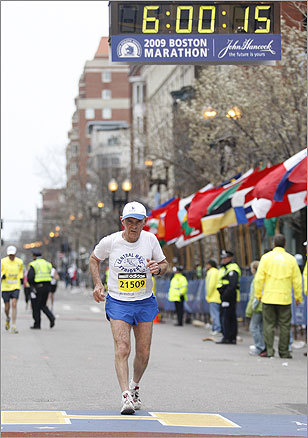
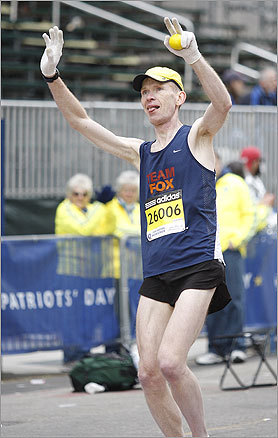
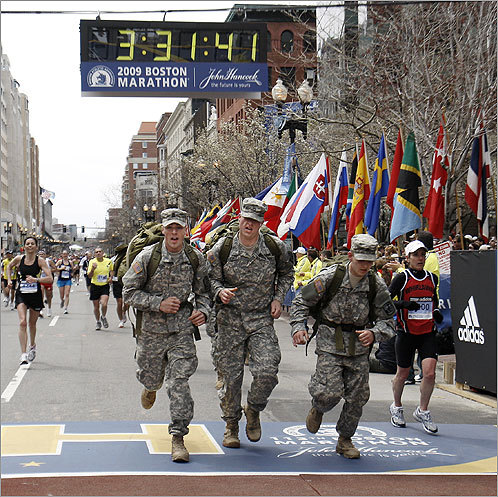

Even in early youth, when the mind is so eager for the new and untried, while it is still a stranger to faltering and fear, we yet like to think that there are certain unalterable realities, somewhere at the bottom of things. These anchors may be ideas; but more often they are merely pictures, vivid memories, which in some unaccountable and very personal way give us courage. The sea- gulls, that seem so much creatures of the free wind and waves, that are as homeless as the sea (able to rest upon the tides and ride the storm, needing nothing but water and sky), at certain seasons even they go back to something they have known before; to remote islands and lonely ledges that are their breeding-grounds. The restlessness of youth has such retreats, even though it may be ashamed of them.
"We want a poem to be beautiful, that is to say, a verbal earthly paradise, a timeless world of pure play, which gives us delight precisely because of its contrast to our historical existence with all its insoluble problems and inescapable suffering; at the same time we want a poem to be true…and a poet cannot bring us any truth without introducing into his poetry the problematic, the painful, the disorderly, the ugly."- AudenThat's from Auden's book of prose, The Dyer's Hand. You can read a 1963 review of the book by poet, John Berryman. (Thanks to the New York Review of Books for putting up these old issues online. We would never be able to read these old gems otherwise!)

Hat tip to Gautam John for the link.So they’re back. Fifteen years after leaving us for the Texas Governor’s Mansion, Laura and George W. Bush have returned to Dallas. Not since the Jonas Brothers bought a house in Westlake have so many North Texans gossiped about their new neighbors. When the former leader of the free world moves to town, there’s a lot to talk about. In the following pages, five writers explore how the Bushes will affect our lives in Dallas—from why China might be our new BFF to how to survive an encounter with the Secret Service. Let’s be careful out there.
And just like that, my #NPM2018 celebrations end with a poem today by Emmy Pérez. Not one more refugee death by Emmy Pérez A r...
